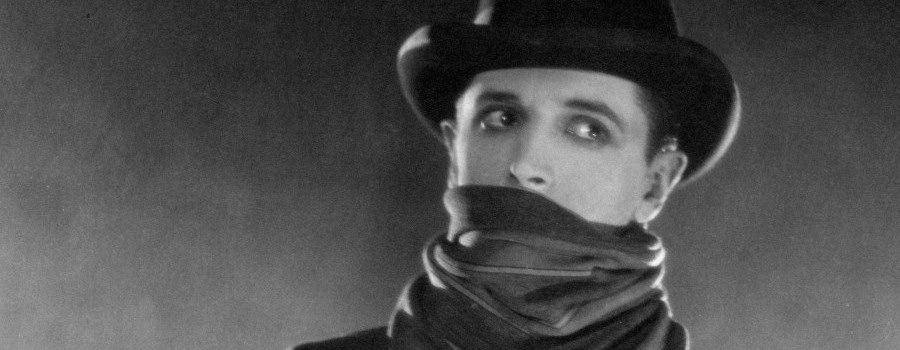A Year with Hitchcock: The Lodger, by Reed Lackey
20 Jan
Hitchcock, and most of his critics and fans, consider The Lodger to be the first “true” Hitchcock film, despite the couple of earlier entries in his catalogue. It is unquestionably the most noteworthy of all of his early silent films. The Lodger certainly feels like what you would expect from an early Hitchcock film. It contains nearly all of the suspense master’s trademark qualities: suspicion, intrigue, murder, and – of course – blondes.
It is also the first representation of his most common theme, although mentioning precisely what that is would certainly constitute as a spoiler, so I’ll save it for the end.
The story begins, as the subtitle suggests, on a foggy night in London. A murderer of blonde women is on the loose and the police have successfully obtained a description. He wears a long black cloak and is carrying a briefcase.
So when a mysterious stranger fitting that precise description arrives at a local boarding home where the landlady and her husband also have a lovely young blonde daughter, he is immediately cast in an ominous and suspicious light. What follows is a series of presumptions, clues, and coincidences sending our characters through a continual debate of “is-he-or-isn’t-he-a-killer.”
Even with my first viewing, I concluded the ultimate resolution about whether or not the mysterious titular character was nefarious. But it was still a surprising amount of fun to watch the characters shift between affection and unease as they considered the string of murders and the coincidental arrival of their eccentric new tenant.
Hitchcock really feels like he’s having fun here, exploring both practical and narrative devices to enhance the suspense and the underlying dread the characters are experiencing. My favorite shot was of the downstairs inhabitants staring up at the ever-pacing lodger, as we the audience see his pacing steps through a pane of glass. It was a simple, but effective visual invention that would be only one of the first of many cinematic techniques Hitch would explore.
The theme I referenced earlier (spoilers for the resolution of the film) is the narrative device of an innocent man caught in a series of unfortunate coincidences. Hitchcock was deeply affected by an incident which occurred when he was a young boy where his father sent him to the police station with a note requesting that he be locked up for some forgotten transgression. Hitchcock always claimed that the story was true, although other sources close to him doubted its authenticity.
Whether real or imagined, the idea of an innocent man caught up in a series of punitive consequences would be revisited numerous times throughout Hitch’s work and would frequently form the primary situational thrust of his films. And it is one of the handful of reasons The Lodger is considered the first true Hitchcock picture.
Time may have relegated it primarily to the realm of novelty, but The Lodger still stands as an exceptional early achievement for one of the greatest directors in film history.
Summary:
Accessibility – Available on Blu-Ray from The Criterion Collection
Themes – Murder, Suspicion, Accused Innocent Men
Category – Good, for the Curious




No comments yet